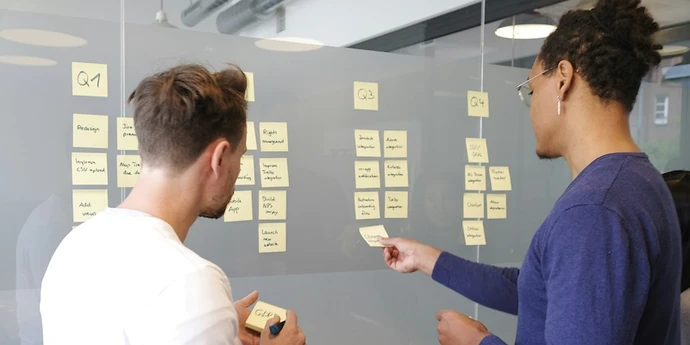If you're trying to break into product management without direct experience, you’ve probably thought about joining a bootcamp.
These programs promise a lot: practical skills, industry connections, and maybe even a fast track to your first PM job. But with some bootcamps costing $3,200 or more, it’s fair to ask: Are they actually worth it?
In this guide, we’ll break down what PM bootcamps really offer, how much they cost, and whether they make sense for someone entering product without prior experience. We’ll also share a few alternatives, such as career coaching, that may be a smarter (and more affordable) way to start your PM career.
- Everything you need to know about product manager bootcamps in 2025
- Product manager bootcamp alternatives
- Best product manager bootcamps 2025
Get clarity on your next steps
Let’s dive in!
1. Everything you need to know about product manager bootcamps in 2025↑
At this time, product management is a highly competitive field. Entry-level PM openings have become exceedingly rare in the current market, and many companies now expect new hires to have some background in the field.
Insiders report that even roles asking for only 2 years of experience receive hundreds of applications, often from people with 4+ years of experience. This means that newcomers are competing against seasoned professionals for junior PM positions.
The lack of true entry-level roles, combined with an oversupply of experienced applicants, makes it very challenging for aspiring product managers to snag that first PM job.
If you’ve been struggling to land interviews or get your PM career off the ground, you’ve probably looked into bootcamps and other alternatives to gain experience and improve your chances in a tough job market.
Here, we answer the main questions you're likely to have about product management bootcamps: how it works, is it worth it, what are the prices, etc.
Feel free to skip straight to the shortlist of the best product manager boot camps in 2025.
1.1 What is a product manager bootcamp?
A product manager bootcamp is a short, intensive program designed to help you gain the skills needed to land a role in product management. It typically focuses on core PM responsibilities like product strategy, roadmapping, stakeholder communication, and user research.
Most bootcamps last anywhere from a few weeks to a few months and include a mix of live classes, hands-on projects, and mentorship. These programs aim to simulate real-world product work. The goal is to give you a foundation strong enough to help you pivot into a PM role, even if you don’t come from a traditional product background.
1.2 Will a product manager bootcamp get me a job as a PM?
Here’s the honest answer: probably not on its own.
Breaking into product management is tough, and undergoing a bootcamp alone usually isn’t enough to land you your first PM role. Our research on 150 PMs at Meta, Google, and Amazon shows that only 7% were hired into product roles straight out of school with no prior experience. The rest transitioned from adjacent roles like engineering, analytics, or marketing or moved into PM internally.
We also looked at Reddit threads, and most people agree that bootcamps are helpful for exposure but rarely lead straight to a job. Many say product management takes time to learn, and no short program can fully prepare you without real experience.
And unless your employer is footing the bill, some suggest skipping the bootcamp and investing instead in more affordable courses, side projects, and free resources like YouTube.
That said, a bootcamp can still be useful for learning core skills, building a network, and showing commitment to the role. Just don’t expect one to be your golden ticket.
If you're just starting out, you might have better luck working with a career coach to build a more personalized path into product. You can also check out our data-backed guide on the four most common ways to transition into a PM role.
1.3 What's the difference between a product manager bootcamp and a course?
A lot of people confuse product management bootcamps with online courses, and to be fair, it’s an easy mix-up. Some PM courses are even styled as bootcamps, which adds to the confusion. Here’s how they differ:
- Courses are usually self-paced, lower in cost, and great for brushing up on concepts. They don’t usually come with live instruction, mentorship, or job support. You might find them on platforms like Coursera, Udemy, or LinkedIn Learning.
- Bootcamps are more immersive. Most follow a cohort model, with live classes, one-on-one mentorship, hands-on projects, and sometimes even career coaching or job placement support. The goal is to simulate real-world PM work while helping you build a portfolio and a professional network.
If you're just exploring product management, a course might be all you need. But if you're serious about switching careers, a bootcamp may offer the structure and support to help you make that move.
Check out the shortlist of PM courses in the next section if you’re weighing both options.
1.4 How much will a product manager bootcamp cost?
Most product manager bootcamps cost between $3,500 and $10,000+, depending on the length of the program, the depth of the curriculum, and whether extras like mentorship or job support are included.
We reviewed five of the most popular product management bootcamps for 2025, and as you’ll see in the table below, pricing and structure vary widely.
Let’s take a look.

Please note that while we try to keep this article updated and current, companies may change their prices after this article’s publication.
1.5 Is paying for a product manager bootcamp worth it?
Not always. Whether a product management bootcamp is worth it depends on your goals, learning style, and budget.
If you prefer structure and live instruction, a bootcamp might be a good fit.
But if you're self-motivated, you might get just as far (for less) with online courses and free YouTube content.
You can also supplement your prep with a few targeted sessions with a career coach on platforms like IGotAnOffer.
1.6 Which certification is best for product manager jobs?
There’s no gold-standard certification for product managers, and most hiring managers don’t expect one.
If you’re transitioning from another field, a certification can help you learn the basics and speak the language. Some Reddit users say it gave them more confidence in interviews.
That said, a product management certificate might help you do the job, but it’s rarely enough to get you the job on its own.
If your goal is to stand out to recruiters and hiring managers, working with coaches who have real PM experience at top tech companies might be a more worthwhile investment.
2. What are the alternatives to a product manager bootcamp?↑
Bootcamps aren’t the only way to break into product management, especially if the high cost or time commitment feels like a stretch. Below are other flexible and affordable options worth exploring.
2.1 Do a product manager course
Courses are a great starting point if you’re still exploring the field or working full-time. They’re usually shorter, lower-cost, and self-paced or part-time.
The downside? Most courses don’t include live mentorship, project feedback, or job placement support, so they’re less useful if you’re looking for hands-on guidance or a clear path into your first PM role.
Here are a few popular options to consider. All courses are online unless stated otherwise:
- General Assembly (10 weeks, $3,950): Teaches you how to balance business goals, technical feasibility, and user needs. Focuses on real-world product skills for startup and enterprise roles.
- Product School ($3,999 - $13,000, depending on the program and duration): Cohort-based program with 30 hours of live instruction, 1:1 coaching, resume reviews, mock interviews, and a portfolio project. Includes access to on-demand content, frameworks, and case studies.
- BrainStation (8 sessions, pricing available upon request): Covers product strategy, Agile, prototyping, and go-to-market planning. Available online or in person at any of BrainStation’s campuses.
- Udacity (2 months, starts at $124.5/mo): A full product lifecycle program that includes market research, product roadmaps, UX design, and Agile. Offers hands-on projects to simulate real-world PM work.
- ProductGym (10–12 weeks, $6,000): The program has two tracks: Skills Development and Career Acceleration. Structured like a bootcamp, but with flexible scheduling. Offers job search support alongside technical prep.
- Google’s PM Certification on Coursera (6 months at 10 hours/week, $49/month): Designed for beginners interested in project and product management. Covers Scrum, Agile, stakeholder management, etc.
You’ll usually get a certificate once you complete a course, which shows you've built foundational PM skills. But like bootcamps, that credential alone will not guarantee a PM job.
2.2 Get career coaching and mentoring from a top product manager
If you’re aiming to break into product management, especially without direct experience, working with a career coach can help you take the right steps from the start.
Whether you’re completely new to the field or transitioning from another role like engineering, marketing, or operations, a PM coach can help you:
- Identify how your current skills translate to product management
- Build a plan to reach your first PM role, even if you're starting from zero
- Adapt your resume, portfolio, and LinkedIn for PM applications
- Prepare for interviews with mock sessions and actionable feedback
- Figure out whether product management is the right career path for you
- Stay accountable and motivated through the job search
At IGotAnOffer, we have experienced PM coaches from companies like Google, Meta, and Amazon, many of whom have also interviewed and hired candidates themselves. They know exactly what stands out in a resume, what skills matter, and how to navigate the hiring process from start to finish.
If you want to find out even more about career coaching, click here to read our deep dive: "What is Career Coaching? A Complete Guide".
Or, if you're an aspiring product manager looking for PM-specific career coaching options, check out our list of the best product management coaching services.
2.3 Get experience in a product-adjacent position
If you want to learn on the job, the next best step is to work in a product-adjacent role.
In our research of 150 PMs at Google, Meta, and Amazon, 42% transitioned into PM by switching companies, and 28% moved into the role internally, often from roles that overlap with product work.
Common product-adjacent roles include:
- Engineer (25%): Software engineer, analytics engineer, QA, product architect
- Program manager (23%): Technical program manager, implementation manager
- Business and operations (17%): Business analyst, finance analyst, operations associate
- Marketing (14%): Product marketing manager, marketing analyst, brand specialist
- Design (7%): Product designer, UX researcher, design strategist
- Other (14%): Customer insights, city launcher, category manager, and even founders
While gaining experience in these product-adjacent roles, think about how your current responsibilities and skills could transfer to PM.
If you're in analytics, for example, the research and recommendations you deliver can naturally evolve into shaping product requirements. The same goes for engineers, marketers, and designers, who are already involved in different stages of the product lifecycle.
If your company has a product team, look for ways to join cross-functional projects or shadow a PM. And if it doesn’t, you still have options: apply for a PM role elsewhere or boost your resume with an MBA or other postgrad degree.
You can read more about these transitions in our guide to breaking into product management.
3. Best product manager bootcamps 2025↑
To put this list together, we analyzed customer reviews, curriculum quality, and pricing. We also reviewed feedback from platforms like Trustpilot, G2, and Reddit, and arranged them here from the highest average rating (5.0/5.0) down.
Of course, this list isn’t exhaustive. There are likely new and promising product management bootcamps in 2025 that we haven’t included at the time of writing.
Still, if you want to save time comparing your options, this guide will give you great PM bootcamp options.
#CareerFoundry (Best for flexibility and support)
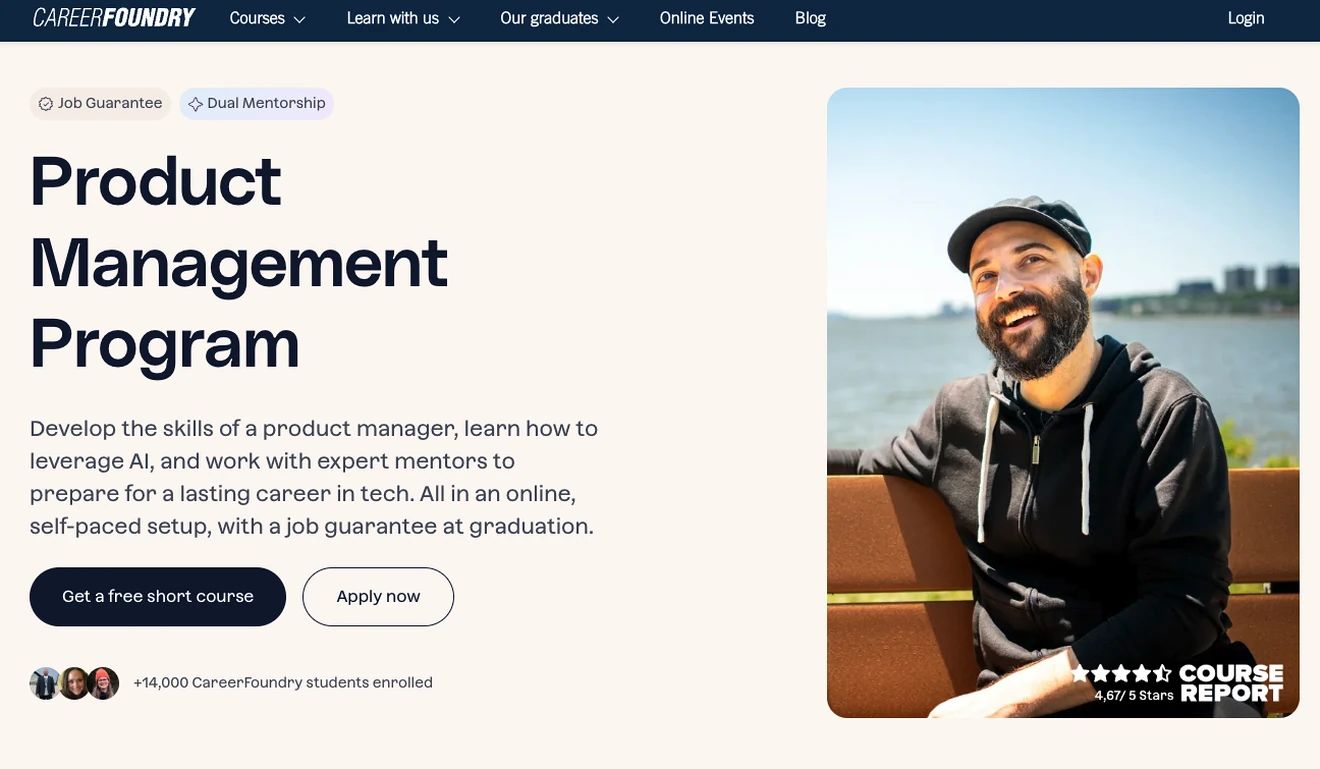
CareerFoundry helps people break into tech with courses in UX, UI, data analytics, and product management. Their product management program is designed for career changers and is completely remote and self-paced (though you’ll need to hit certain milestones to stay on track).
What we find so great about CareerFoundry is its dual mentorship model, which pairs you with a mentor and a tutor, plus a career specialist to support your job search.
Your mentor is a senior product manager who helps ensure your project work aligns with your long-term career goals. Alongside them, a tutor provides assignment feedback to help you stay on track.
You’ll also work with a career specialist who’ll support your job search by reviewing your resume, running mock interviews, and helping you build a strong portfolio.
The full course is meant to be completed in 6 months, and you can put in anywhere from 15 to 40 hours per week. If you don’t land a job within six months of graduating, you can request a full refund.
CareerFoundry also offers free events covering data, design, marketing, and product, as well as live skills workshops.
At $6,900, it's on the higher end, especially if you're early in your career or not yet earning a PM-level salary. Some users on Reddit also flagged that mentorship is capped at 10 calls, which isn’t mentioned on their website. That’s worth keeping in mind if you expect a lot of hands-on support.
#allWomen (Best for women in tech)
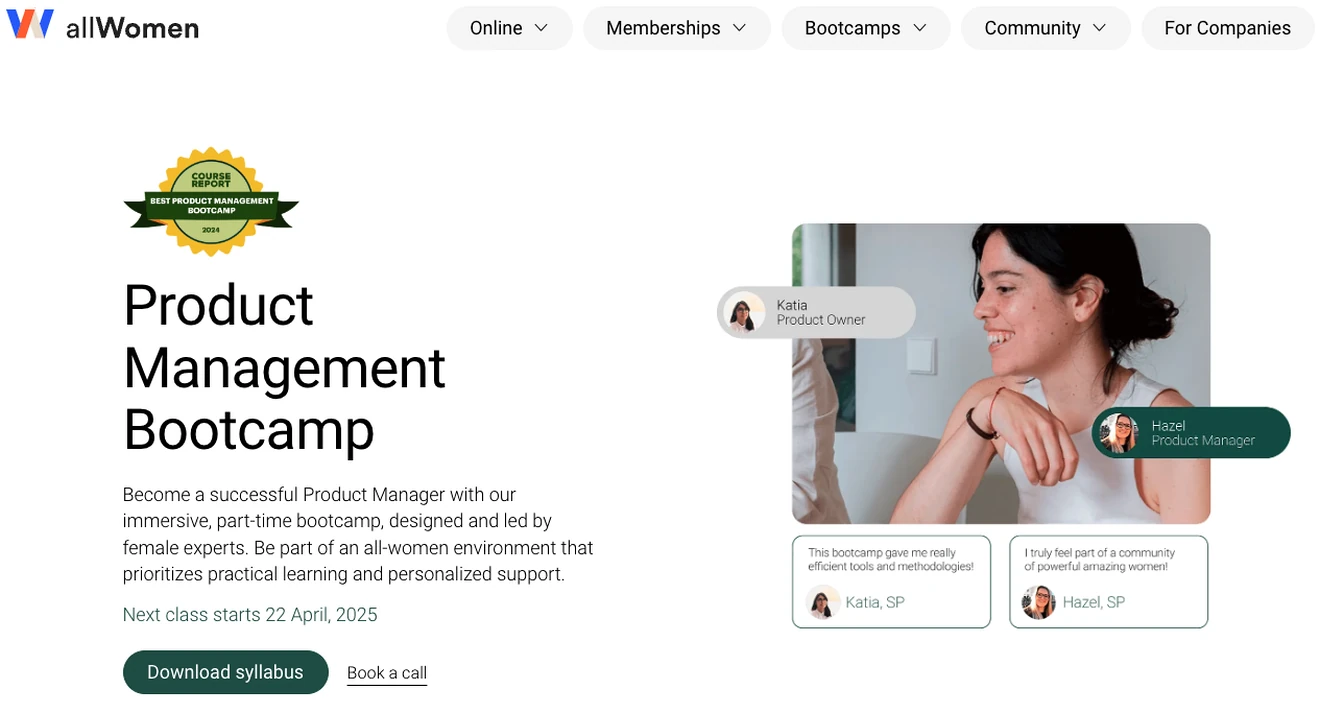
Breaking into tech isn’t always easy for women, and allWomen was built to change that. Founded by Laura Fernández, this Europe-based bootcamp is built specifically for women transitioning into tech careers.
The Product Management Bootcamp runs for 10 weeks and includes 100 hours of live, online classes. It also comes with 1:1 mentorship, resume and LinkedIn reviews, and access to a Hiring Fair that connects graduates with companies looking for female tech talent.
Students also work through five self-paced modules and monthly live sessions with female industry experts. You’ll complete a final project for your portfolio and get lifetime access to the allWomen community of over 30,000 members.
It’s a solid option if you want a women-led program with strong career support. Just keep in mind that since it’s Europe-based, job help and live sessions may be harder to access if you’re outside the region.
It’s also a smaller, more niche program than global bootcamps like CareerFoundry, so you might find fewer networking opportunities after graduation.
Pros: Women-led, strong mentorship, career support
Cons: Limited job network outside Europe
#Circuit Stream (Best intensive program)
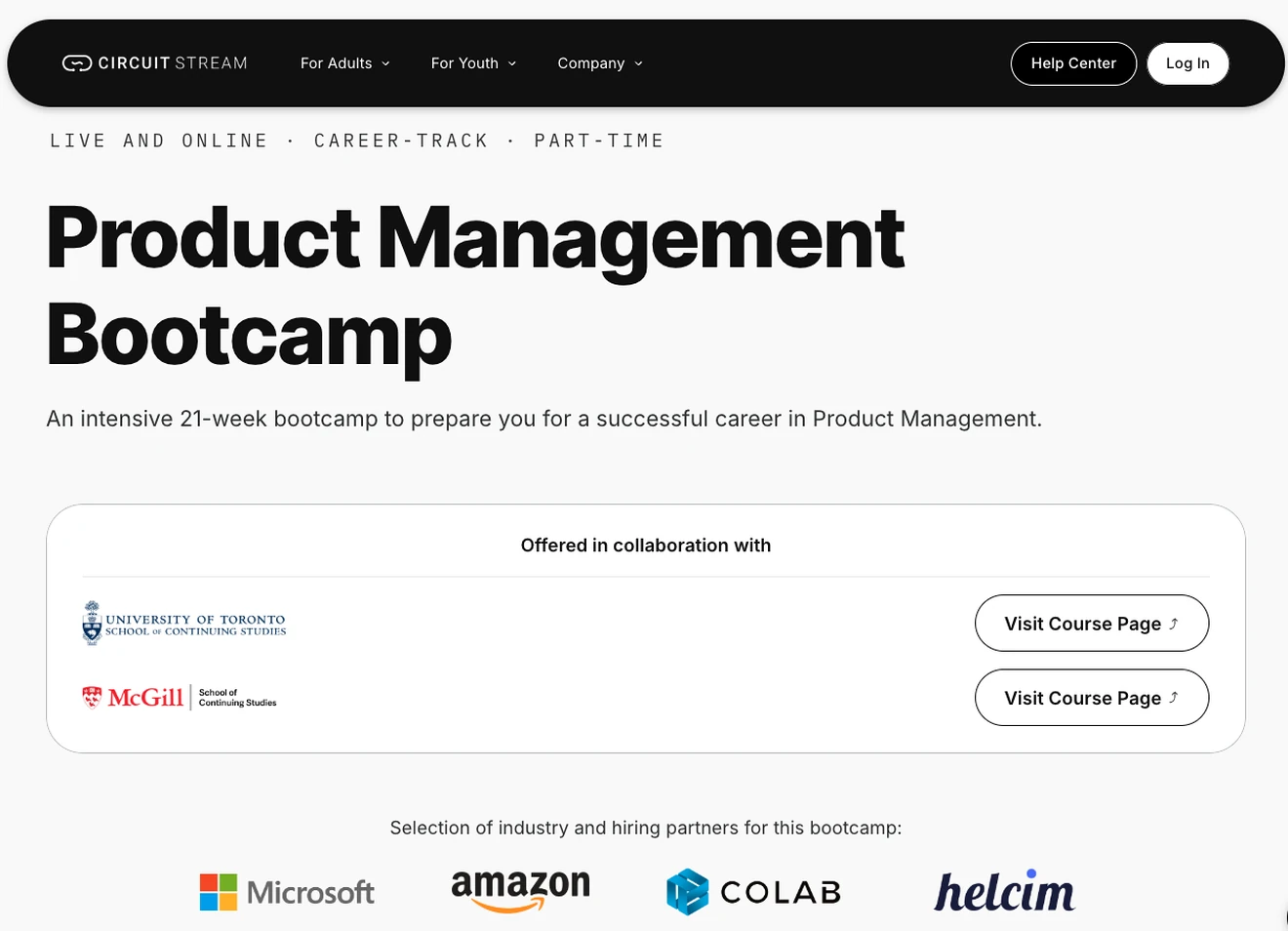
Circuit Stream’s 21-week Product Management Bootcamp is offered in collaboration with the University of Toronto and McGill. The course is fully remote and includes five hours of live instruction each week, led by instructors from companies like Amazon and Microsoft.
According to their website, students get access to 1:1 coaching, career support including resume feedback, and a Discord-based alumni network to stay connected after graduation.
One thing to keep in mind is that while the program is labeled “beginner-friendly”, the $10,500 price tag makes it the most expensive bootcamp on our list. Also, if you’re balancing it with other commitments, this might not be the best fit, as reports say the pace and workload can be intense.
Circuit Stream offers a full refund (minus any admin fees) if you withdraw in writing at least seven days before your course starts. You also have the option to defer to a later cohort.
#Co.Lab (best for practical learners)
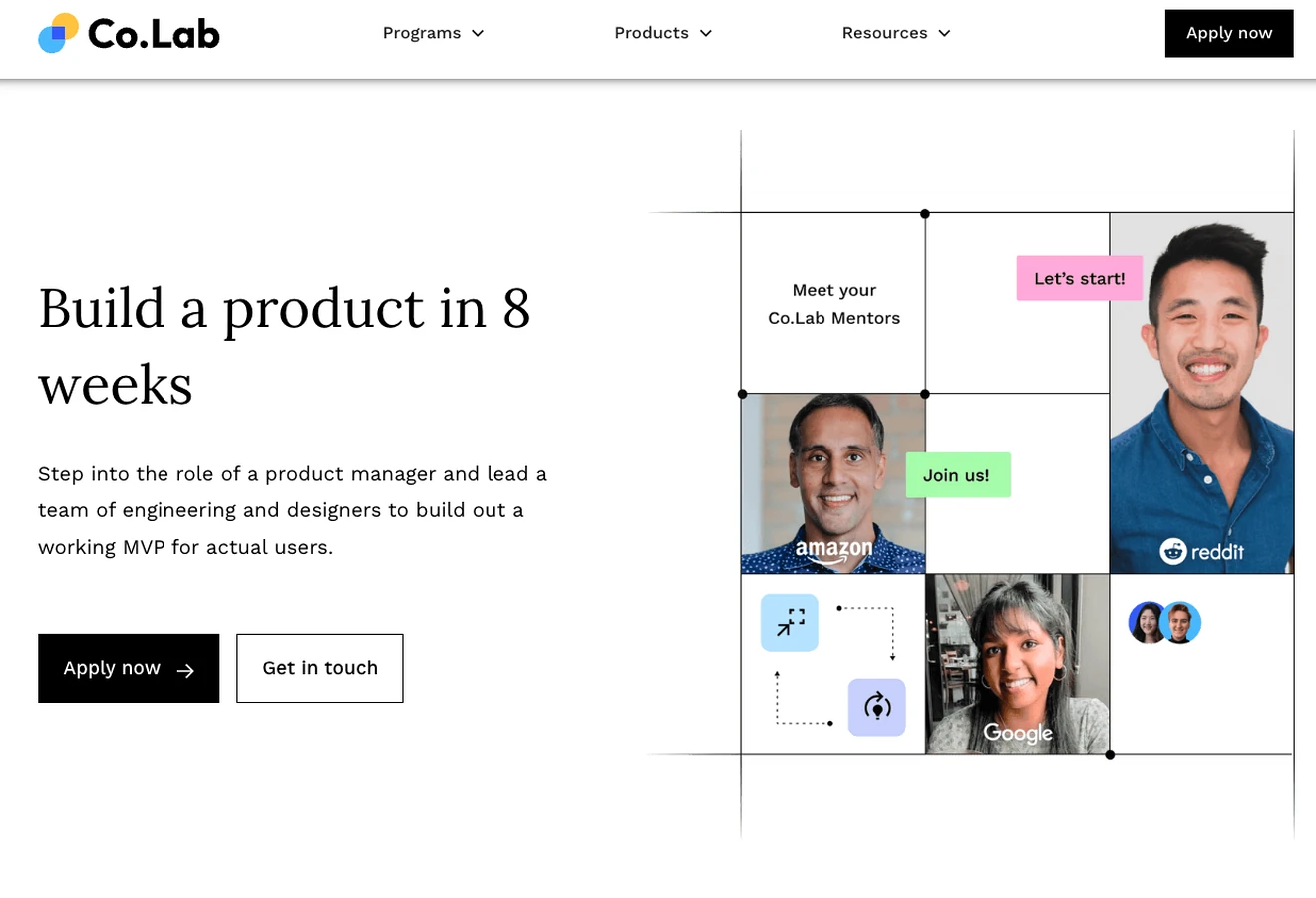
If you learn better by doing, Co.Lab’s program might be more in your lane. In this 8-week, part-time bootcamp, students are grouped into cross-functional teams to ship a real minimum viable product or MVP. You’ll lead your own product team, execute a roadmap, and work through the full product development lifecycle.
Classes are fully remote, with live sessions on Monday and Tuesday evenings (6:30–7:30 PM EST) and a weekly commitment of 10–15 hours. You’ll get weekly 1:1 mentorship from product leaders at companies like Amazon, Coursera, Ancestry, and Rakuten to help with resume reviews, career planning, and growing your product skills.
Co.Lab also offers a shorter 6-week AI Product Management course for those who want to upskill in AI/ML and learn how to manage AI-powered products. It’s led by a Senior Technical PM from Microsoft.
There are a few quick testimonials available on the Co.Lab website, and you’ll also find more in-depth reviews from past students on their LinkedIn page.
Get Clarity on Your Next Steps With IGotAnOffer↑
We hope this guide helped you compare your options and figure out which product management bootcamp (or alternative) might be right for you, or if it’s at all the best choice for you.
If you’re still unsure or want support building a clear path into product management, working with a career coach can make a big difference. Working with a PM coach can help you gain clarity, build confidence, and create an actionable plan to achieve your goals.
So if you want to check out our career coaching services, browse our platform’s over 90 coaches with experience at many top companies. They’ve been on both sides of the hiring process and can help you create a realistic plan, whether you’re switching careers, looking to grow in your current role, or aiming for your first PM job.
Search by industry, role, or company to find the right match for you. You can see the coaches' hourly availability and book your online session in a couple of clicks.







